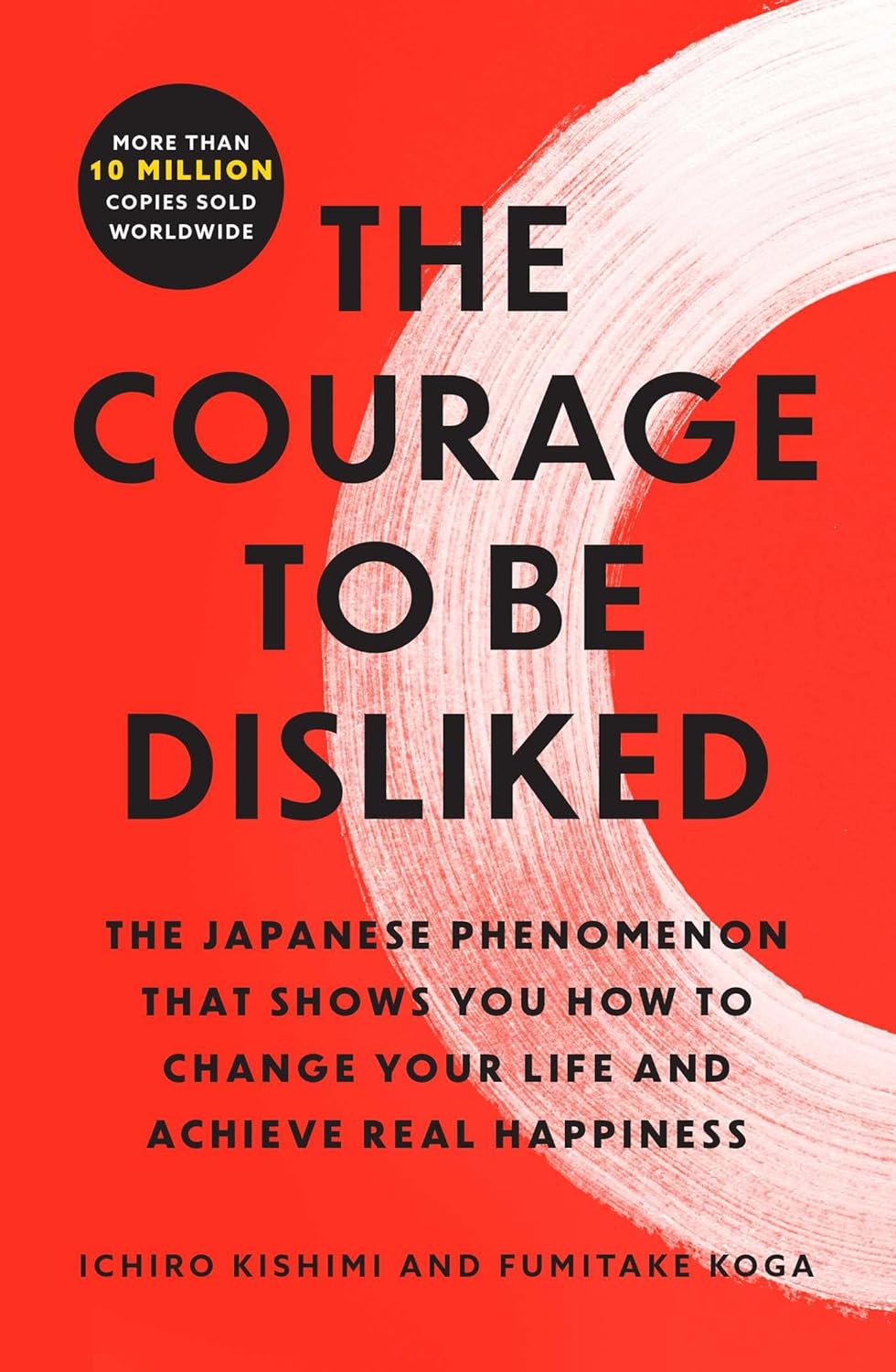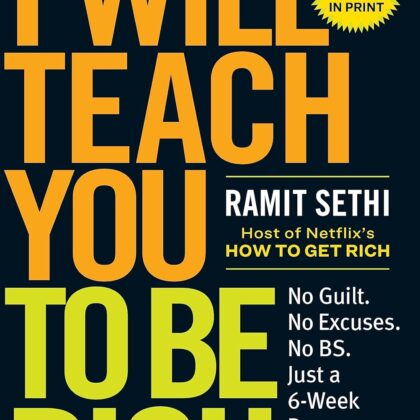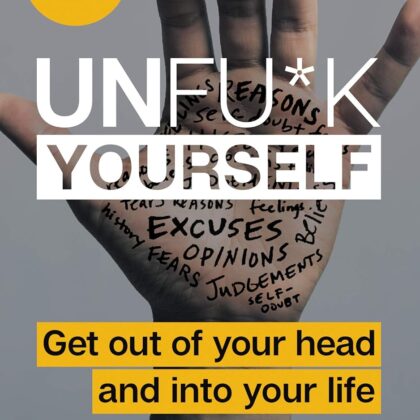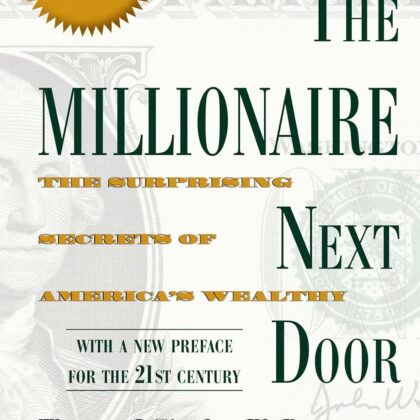🌟 Discover the Life-Changing Power of Courage 🌟
The Courage to Be Disliked is an international phenomenon and bestseller that has sold over 10 million copies worldwide. This transformative book challenges conventional thinking and shows you how to live a life of true personal freedom, happiness, and self-fulfillment.
Drawing on the revolutionary psychological theories of Alfred Adler, this book provides practical guidance on how to:
-
Free yourself from the burdens of past experiences and childhood trauma
-
Let go of societal pressures and expectations
-
Cultivate self-acceptance, confidence, and mental clarity
-
Build meaningful relationships while staying true to yourself
📖 A Unique Dialogue Format
Instead of a traditional guide, the book unfolds as a conversation between a wise philosopher and a young man seeking answers about life. Over five engaging dialogues, readers learn that happiness is a choice, and that we alone are responsible for directing the course of our lives.
💡 Why This Book Stands Out
-
Offers practical advice you can apply immediately in daily life
-
Encourages a mindset shift toward empowerment and courage
-
Combines deep philosophical insight with straightforward, easy-to-read lessons
-
Perfect for anyone seeking self-improvement, emotional freedom, and true happiness
✨ Empowering, Enlightening, and Liberating
Millions of readers have already discovered the power of Adler’s philosophy through this book. The Courage to Be Disliked isn’t just a book—it’s a guide to living your best life, letting go of fear, and embracing who you truly are.
Take the first step toward freedom and happiness today. It’s time to unlock your potential, redefine your life, and find the courage to be disliked.





Amazon Customer –
Embracing Divine Freedom: The Courage to Be Disliked in the “Christian” Journey
In “The Courage to Be Disliked,” authors Ichiro Kishimi and Fumitake Koga present a compelling dialogue that bridges the gap between psychology and philosophy, drawing on the principles of Alfred Adler, a founding figure of individual psychology. The book is structured as a conversation between a philosopher and a young man, providing a unique narrative style that engages readers on both intellectual and emotional levels.One of the most significant contributions of this work is its exploration of the human desire for approval versus the necessity of self-acceptance. Kishimi and Koga argue that the need for recognition from others often leads to a life dictated by external expectations, thereby stifling personal growth. They challenge readers to cultivate the courage to be disliked, a radical notion in a society that often prioritizes conformity and seeks validation through social acceptance.The authors delve into the importance of embracing one’s individuality and the role of community in fostering personal development. They advocate for accountability to oneself and the value of authentic relationships over superficial connections. This perspective is particularly relevant in today’s hyper-connected world, where social media often blurs the lines between genuine interactions and performative relationships.Moreover, the book resonates with biblical principles, emphasizing themes of personal responsibility and the transformative power of self-acceptance. Readers familiar with spiritual teachings will find profound connections between Adlerian psychology and scriptures that promote love, understanding, and community engagement.The dialogue format maintains a refreshing pace, inviting readers into a philosophical inquiry that prompts introspection. With each turn of the page, Kishimi and Koga’s insights provoke thought and reflection, offering practical guidance that readers can apply to their own lives.While some may find the ideas challenging or even counterintuitive, “The Courage to Be Disliked” ultimately serves as an empowering manifesto for anyone seeking to break free from the shackles of societal expectations. It encourages a shift in mindset, proposing that true happiness lies in the acceptance of oneself rather than the pursuit of external approval.In conclusion, “The Courage to Be Disliked” is not merely a self-help book; it is a philosophical treatise that compels readers to rethink their understanding of self-worth, relationships, and personal freedom. Whether you are a seasoned scholar or a curious newcomer to these concepts, this book is a valuable addition to your library—an enlightening read that promises to foster growth and enhance one’s journey towards self-discovery.
76 people found this helpful
Brownie –
A must read story to avoid conformity and open your mind to new ideas!
A great book to live your own life and chart your own destiny. It makes hard concepts easy to understand. I love the method of organization, where the author uses a student to teacher dialogue to tell the story. I would read this book annually.
3 people found this helpful
Anaya –
Good book
Good book. I like how the man and the boy go back and forth. Very insightful and makes you think.
Ashley Castro –
Gives you a whole new way to think about happiness
This book really challenged how I see myself and my relationships. It’s written like a conversation, which makes the deep stuff feel easier to digest—but don’t get it twisted, it will make you pause and reflect.It’s not just about not caring what people think—it’s about taking full responsibility for your own life and finding freedom in that. Some parts were uncomfortable (in a good way), and it definitely left me with a few “ah-ha” moments. If you’re in a season of growth or just feeling stuck, this book is a powerful mindset shift.
3 people found this helpful
J –
Solid philosophy book
I really like some of the paradigm shifts this book points out and the philosopher/ youth dialogue is a fun way to read and understand the messages the author is trying to convey.
Monica –
The Conversational Format Threw Me Off
Hello! My name is Monica, and I am a people pleaser. When I saw The Courage to be Disliked by Ichiro Kishimi and Fumitake Koga I knew I needed to read it. The courage to be disliked is something I need in my life!The cover of the book is simple, yet elegant. Peaceful. I like the colors and the image. It’s definitely inviting. I was very excited to read it and gain all this wisdom and knowledge—and change my life!Then, I opened the book to the introduction. Maybe I should have realized this beforehand, but I didn’t. The entire book is written in dialogue form. The whole thing is a big conversation. Honestly, I was upset but decided to give it a try and keep reading.I’m sure there are great amounts of wisdom in this book, but I don’t think I’m smart enough to glean them from the text. I read the whole book, and the conversational format completely threw me off.Philosophy is not my jam. I know the names of Freud, Socrates, Plato, and Aristotle, but I have no idea what they taught or discussed. Yes, I’m showing my own ineptitude here, but that’s why I wanted to read the book. I wanted to learn and understand more about philosophy. In my opinion, this book is not the way to go to do that.What did I want? Well, I need a philosophy for dummies book. Start at the very beginning and explain, in detail, who the philosophers are and what they believe or teach. Give definitions, examples, and more examples so I can highlight them, take notes in the margins, and have time to think and process the info. The conversational format did not allow for that at all. The conversation moved on and left my understanding lying on the ground behind it.Another thing I had a difficult time with was that there are several anti-Christian references, which I didn’t like. He also makes it seem like you can just think your way out of ADHD and mental illness. Sorry–I live with and love a few people with ADHD and mental illness, and it’s not that easy.If you have more of a background in philosophy and psychology, and if you understand the different philosophies of Freud and Adler, then this book may be more for you!Did I gain the courage to be disliked from The Courage to be Disliked? Ummmm…no. Sadly, I did not. It’s ok, though! I’ll keep working on it!Content Rating: PG -Profanity: None -Intimacy: None -Violence: NoneAge Recommendation: 16+ (Younger readers will not understand or care.)3/5 stars
495 people found this helpful
CapeCodGuy –
One of the very few self-help books that may actually change your life.
Wow. How is Sigmund Freud a household name but Alfred Adler a mere afterthought, a footnote? Even as a pretty serious psychology autodidact and after taking numerous college classes (intro, child, adolescent, personality psychology) I must admit I didn’t even recognize his name let alone his research or theories. But the Japanese are onto something, ahead of the rest of the world as it seems they tend to be (I just recently read about topics such as shinrin-yoku and nano-hydroxyapatite), ahead of the rest of the world.Adlerian psychology AKA individual psychology is hopefully here to stay. You can see evidence of the culture shifting to corroborate its views—evidence of the coming to fruition of Alder’s own prophecy on why he’d be forgotten: “The implication being that if his [ideas] were forgotten, it would be because [they] had outgrown the bounds of a single area of [philosophy], and become commonplace, and a feeling shared by everyone.” Take for example the recent publication by bestselling author David Brooks; if you’ve read The Courage to Be Disliked, you’ll immediately recognize the parallels to Adlerian psychology in the cover flap summary of The Second Mountain.Really this isn’t a self-help or personal growth book as much as it is an introductory philosophy book with the power to direct and transform your life. And it sets a new bar for me on which self help books are worth reading (some, not many) and which are garbage (most of them). Not to mention that using the format of Socratic dialogue in and of itself is just a brilliant choice by the authors. How this book can be rated anything below 5 stars is unfathomable by me, and makes me question my faith in humanity, the good judgment of the common person.I hope the tides of history turn, that in 50 years it’s not Fraud (oops I mean Freud) who will be revered as the father of modern psychology but that Alfred Adler will rightly take his place with that title. I think it’s high time we start to reject the pitifully ineffective disease/disorder paradigm of mental health which has been corrupted by the vices of allopathic medicine (which does have its virtues in other contexts) and start to embrace the more humanistic, holistic, positive growth, teleological (wink wink) approaches to psychology and mental health. Look at the world: current events, mental health statistics, etc. Our current way of doing things (especially in America) is not working. Adlerian psychology is right here under our noses, a beacon of hope waiting to be shone and shown to others. Which is what I implore you to do once you’ve finished reading this book: show it to others! Buy it for them if you have to! I have already bought 3 other copies as gifts to people in my life….you can trust my review because I’m already putting my money where my mouth is. READ THIS BOOK especially if you have not already scaled your “second mountain”
183 people found this helpful
Bli –
tough to read but good
Tough to go through…. to be honest…… It’s a discussion between a young person and a philosopher. The discussions make a lot of sense though.
3 people found this helpful
Vince Mao –
If you feel like you’re living to someone else’s metrics, read this
Great read that gets you thinking about why you care so much about the opinions of others. The psychology behind why you see yourself the way you do, what you can do instead, and what cam change when you live more in line with yourself are included.Definitely one to read again every once in a while.
Kevin Stecyk –
A Must-Read Book to Prepare Yourself to be of Service to Your Community
Two fictional characters, Youth and Philosopher, have a long engaging set of conversations regarding Adlerian psychology in The Courage to be Disliked.Sigmund Freud, Carl Jung, and Alfred Adler were three pioneers in the field of psychology, with Adler being the least famous of the three.I am not wild about the narrative dialog format of this book. That said, I can see that the book might be dry if it were written in a textbook format.Five main themes stood out for me:1. Separation of tasks2. All problems are interpersonal relationship problems3. Community creates a sense of belonging4. Relationships should be horizontal and not vertical5. Stay focused on the here and now, not the past or the futureIn separation of tasks, you ask yourself whose task is this. If it is yours, then you take care of it. Don’t worry about how they perceive you doing your task. If the tasks belong to others, then you provide space for them to complete their tasks.All problems are interpersonal relationship problems. According to Adlerian philosophy, “if all interpersonal relationships were gone from this world, which is to say if one were alone in the universe and all other people were gone, all manner of problems would disappear.” All problems revolve around relationships with others.Our community provides a sense of belonging because none of us can exist as a singular entity. You use goods and services provided by others. As long as you can feel that you are of use to someone else, then you can feel from your own subjective viewpoint that you are making contributions to others, and that provides a sense of your worth.Relationships should be horizontal and not vertical where there are no praises or rebukes. Praise or Rebukes imply that a hierarchical relationship exists because a person has the power to either praise or rebuke. You should strive to be equal with all others.We cannot change the past, and the future is an abstraction. Worrying about either is wasteful. Life is a series of moments called “now.” And we can only live in the here and now. Despite the wishes of some, life is not linear progression. Instead, life progresses as a series of dots.By the end of the book, I found myself grasping to recall everything that I read and to put it into an easily understood mental model. While the book made sense while reading it, by the end, I had forgotten some of the material I read earlier. I just cracked open The Courage to be Happy. From the brief amount that I have read, it seems to reinforce the material covered in The Courage to be Disliked.Because this book made me think more about relationships, I highly recommend The Courage to be Disliked.
92 people found this helpful